Mobile Menu

Lauryn Seering
Washington coach will no longer pray with students (January 8, 2018)
West Virginia kindergarten class lesson plan will remove religious tones (January 2, 2018)
Where: Page Jackson Elementary School in Charles Town.
FFRF’s Atlanta billboard campaign continues secular message
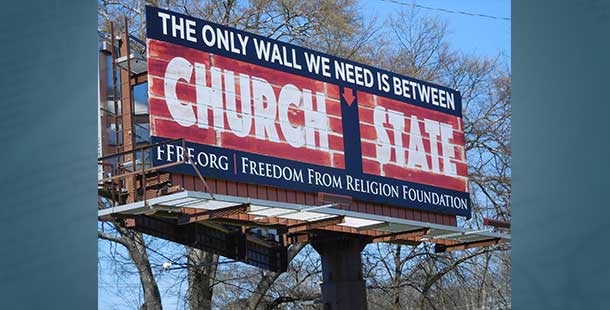
The Freedom From Religion Foundation's billboard campaign propagating freethought and secularism is proceeding briskly in the Deep South.
A new billboard graphically representing the Establishment Clause of the First Amendment has gone up this week on Spring Road near the intersection of Atlanta Road in the town of Smyrna in the metropolitan Atlanta area. The eye-catching panel proclaims "The Only Wall We Need Is Between Church & State" against the backdrop of two portions of a clearly divided brick wall.
The Freedom From Religion Foundation, the nation's largest association of freethinkers (atheists and agnostics), has put up the billboard for a month in Round Three of a new year-long campaign in the South's most bustling metropolis. Two previous billboards in different locations there declared "In Science We Trust," depicting an astronaut suspended in outer space to illustrate the slogan.
Georgia FFRF member Jack Egger is underwriting the campaign, for which FFRF is truly appreciative.
The wall between state and church is under assault as perhaps never before, FFRF contends. All of us should strive to ensure that religion and government are separated from each other, as our Founders envisioned.
"This fundamental constitutional principle needs to be defended today more than ever," says FFRF Co-President Annie Laurie Gaylor. "The United States is not a theocracy: Our government is supposed to be neutral toward religion, and citizens of any religion or no religion are equal under the law. That's why we're reminding the good folks of Atlanta about the importance of this constitutional precept."
The fast-changing demographics of U.S. society makes our secular setup even more essential, FFRF maintains. Current Pew surveys reveal that a quarter of adult citizens and more than a third of Millennials qualify as "None," either specifying atheism, agnosticism or no religion. Since 1990, the number of Americans with no religion has nearly tripled, from about 8 percent to 23 percent. With this trend projected to continue, "Generation Z" is primed to be the least religious generation yet. There are now more "Nones" than Catholics, and by 2035, Nones are projected to outnumber Protestants.
The Freedom From Religion Foundation and its membership work to promote the viewpoint of freethinkers, including atheists and agnostics, and to protect the constitutional principle of separation between religion and government. FFRF has roughly 32,000 members and 20 chapters all over the country, including 500-plus and an Atlanta chapter in Georgia.
Nonbelief Relief announces $75,000 in spring grants

Nonbelief Relief, a leading freethought charity, has announced its early spring grants "to improve this, our only world."
Nonbelief Relief is a charitable organization created by the executive board of the Freedom From Religion Foundation. Its purposes are to serve as a humanitarian agency for atheists, agnostics, freethinkers and their supporters. Nonbelief Relief seeks to remediate conditions of human suffering and injustice on a global scale, whether the result of natural disasters, human actions or adherence to religious dogma. Such relief is not limited to but includes assistance for individuals targeted for nonbelief, secular activism or blasphemy.
The organization is giving:
- $20,000 to Doctors Without Borders, with the request it be used for the group's work in Syria and with Syrian refugees, given the crisis there.
- $5,000 to Violence Policy Center, which is a 501(c)(3) educational group to stop gun death and injury through research, education, advocacy and collaboration. Nonbelief Relief notes that the center is especially important, given the official embargo on gun violence research by the Centers for Disease Control and Prevention.
- $5,000 to UltraViolet, in the wake of the #MeToo and #Timesup movements. UltraViolet works to mobilize millions of activists on a range of issues including reproductive rights, health care, violence, economic security and racial justice.
- $25,000 to the volunteer Women's Medical Fund, in memoriam to FFRF's principal founder Anne Nicol Gaylor, also co-founder of the longest continuously operating abortion fund in the nation. All money goes to pay for abortions for low-income or indigent women in Wisconsin, one of about 35 states that has cut off Medicaid assistance for abortion care. The fund helped more than 1,000 women last year, with an average of $330.
- $10,000 to the Afghan Women's Fund, endorsed by FFRF Honorary Director Katha Pollitt, which works to open schools for girls in Afghanistan and ensure the human rights of Afghan women. Its motto: "Education is the key."
- $10,000 for Camp Quest to use as scholarships for children who would otherwise be unable to afford to attend one of the educational summer programs offered around the country catering to the nonreligious.
Additionally, this year Nonbelief Relief has already given stipends of $5,000 each to three individuals: a feminist journalist forced to leave Bangladesh; a Pakistani man who was accused of blasphemy and tortured and is now (with his family) seeking asylum in the United Kingdom; and a Bangladeshi who co-edited the first gay journal in that country, whose colleague was brutally murdered and who was targeted for assassination. He is seeking asylum in the United States. Articles about their plight will be appearing in FFRF's newspaper, Freethought Today, when they are at liberty to write about their situations. A fourth application for an endangered Pakistani is under consideration.
Nonbelief Relief Administrator Annie Laurie Gaylor notes that given the rising violence and persecution in Islamist nations worldwide, the demands for help from threatened nonbelievers from a variety of nations is also increasing. These stipends are given after vetting with a loose consortium of aid groups and individuals. Most individuals receive assistance from more than one organization.
To quote 19th century freethinking feminist Helen H. Gardener: "I do not know the needs of a god or of another world. . . . I do know that the needs of humanity and this world are infinite, unending, constant and immediate. They will take all our time, our strength, our love, and our thoughts; and our work here will be only then begun."
Please earmark your donation, deductible for income tax purposes, for "Nonbelief Relief" (look for the designation in the donate dropdown), c/o FFRF.
FFRF will unceasingly fight bad Arkansas law
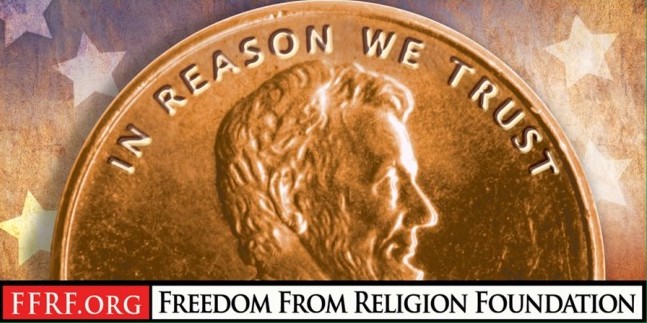
Yet another state law to foist God on the public education system has been put into place — and yet again the Freedom From Religion Foundation will fight it tooth and nail.
An Arkansas bill requiring "In God We Trust" to be displayed in public schools went into effect this month. Act 911 requires the pious quip in every classroom, school library, or building owned or operated with public funds. The "In God We Trust" display posters themselves must be privately donated. The purpose behind the law is clear: to use the machinery of the state to promote Christianity.
As one youth pastor who supported the bill explained, "As a student pastor, I think it's vital that we have that spiritual influence in our schools as much as possible." He continued, "This is who we are, this is who we have been and hopefully, I pray, that's who we continue to be moving forward. In the name of Jesus that our lives will be directed as we obediently follow Christ."
The sponsor of the bill has been a bit more circumspect. Primary sponsor state Rep. Jim Dotson said, "The reasoning behind it is just to recognize the motto and just having it up on display. We have it on our money, so it's appropriate to have it on our walls at our schools."
But this historical veneer is a sham. If Dotson truly wanted to honor our founding history, he would have proposed displaying the phrase proposed by Thomas Jefferson, John Adams and Ben Franklin: E pluribus unum. Instead, he chose the johnny-come-lately motto that happens to evince a belief in his god.
The impact of this law will now be felt by school districts and parents. When religion gets into our public schools, it often creates division.
That is especially true given the shifting demographics in the United States. A recent survey found that 21 percent of Americans born after 1999 — students in those public schools — are atheist or agnostic. Another 14 percent have no religious affiliation. They will all have to put up with this godly intrusion.
The Freedom From Religion Foundation will continue to oppose this law and work to undo it on behalf of its 32,000 members, including its members in Arkansas.
FFRF’s four 2018 student essay competitions offer $30K-plus

The Freedom From Religion Foundation is announcing its four award-laden student essay contests for 2018.
“We consider our essay competitions to encourage and reward young freethinkers to be one of FFRF’s most important forms of outreach,” says FFRF Co-President Dan Barker.
Each of the four contests now offers seven prizes: First place — $3,000; second place — $2,000; third place — $1,000; fourth place — $750; fifth place — $600; sixth place — $500; seventh place — $400. FFRF offers optional honorable mentions of $200. To encourage student activism, Florida FFRF members Dean and Dorea Schramm offer a $100 bonus to any winner who’s a secular student club member.
This year, all eligible entrants will not only receive a digital student membership for FFRF, but a freethinking T-shirt. Students must fill out an online application and upload their essays in PDF format at ffrf.org/studentessay, which contains more details on the topic, prompt and requirements.
College-bound high school senior contest: High school seniors going on to college in the fall will write on the topic: “Why I believe ‘They who live on love and laughter never mess around with the hereafter.’” This rhyme by lyricist Yip (“Over the Rainbow”) Harburg appears on the free T-shirt offered all student entrants. Seniors entering the William J. Schulz High School Contest should address why this world matters and why they reject religion and its promise of an afterlife. Word limit: 300-350 words. Deadline: June 1.
Ongoing college contest: Currently enrolled college students (up to age 24) entering the Michael Hakeem Memorial Contest will write on: “Why I’m an unabashed nontheist, not afraid of burning in hell.” Include why you are an atheist or nonbeliever and address challenges of being a young freethinker in your family or community. Word limit: 450-650. Deadline: July 1.
College Students of Color contest: The David Hudak Memorial Contest for College Students of Color (up to age 24) is on the topic of “Why, as a student of color, I reject religion.” Tell us why you reject religion and what challenges that creates from your family, community and as a minority within a minority. Word limit: 450-650. (College students may only enter one contest.) Deadline: July 1.
Grad/“Older” Students contest: Graduate students (through age 30) and “older” undergrads (ages 25-30) entering the Brian Bolton Graduate/“Older” Contest are asked to write on “The danger of bibliolatry [worship of the bible] in the United States.” Why do bible teachings make bad policy and how can we fight back against campaigns to insert the bible and its dogma in schools, laws and policies? Word limit: 550-750. Deadline: July 15.
Students are required, via the online application, to provide a paragraph bio, age, contact information and intended majors, and college or university attended in North America. By entering the competition, they agree to allow FFRF to publish or excerpt their winning essay in FFRF’s newspaper, Freethought Today, and its website, and to provide a photograph. Students should carefully review all contest rules at ffrf.org/studentessay.
FFRF is appreciative of members who make the effort to contact local high schools, colleges and universities to help publicize its competitions.
FFRF condemns EPA chief’s use of bible to set public policy
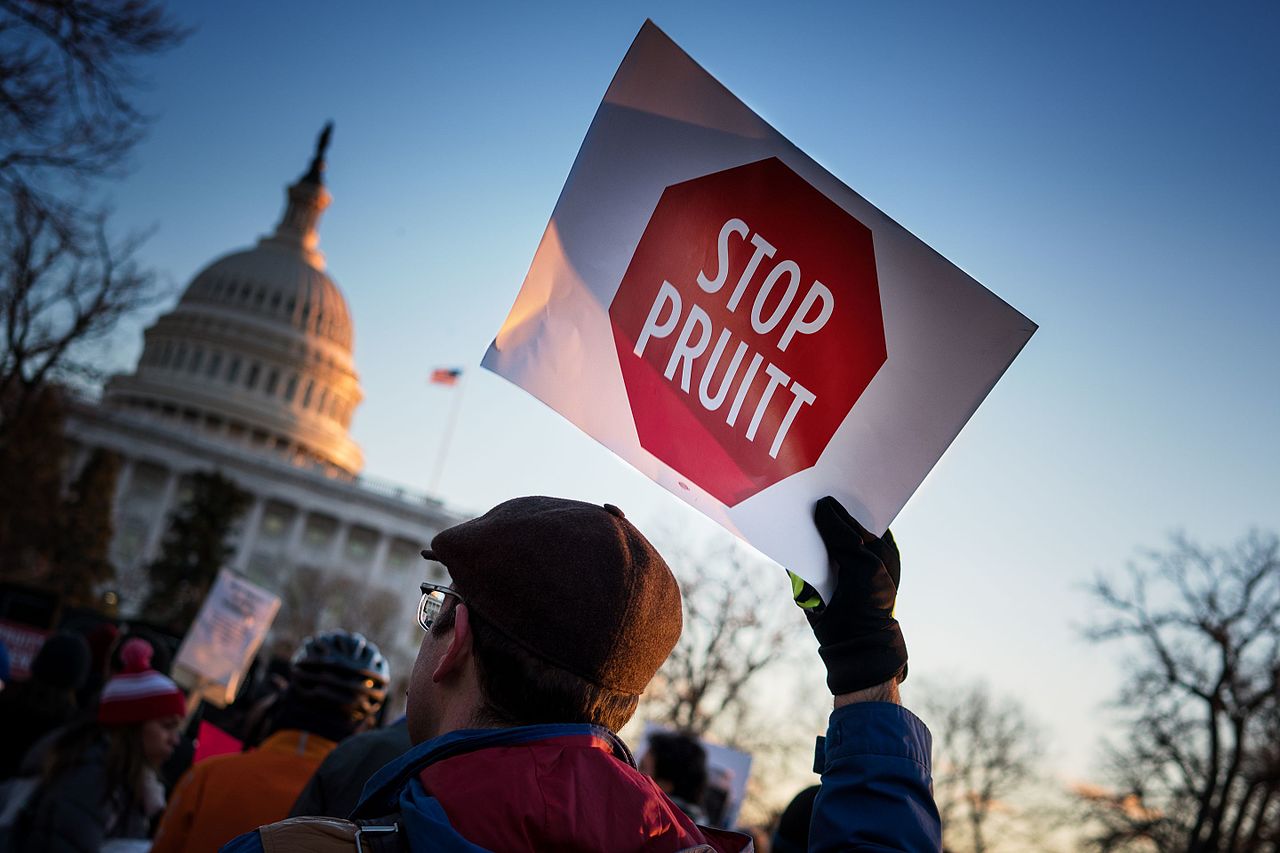
The Freedom From Religion Foundation is condemning EPA Administrator Scott Pruitt's use of the bible to set this country's environmental policy.
In a recent interview with the Christian Broadcasting Network, which has unprecedented access in this administration, Pruitt put forth his theocratic perspective. He explained: "The biblical worldview with respect to these issues is that we have a responsibility to manage and cultivate, harvest the natural resources that we've been blessed with to truly bless our fellow mankind." The article refers to Pruitt as "the kind of guy you might meet in bible study," and that he "believes God commands us to take care of the environment and that also means to use what He has provided."
This is not the first time Pruitt's bible has infected his policymaking. Last October, Pruitt invoked the Book of Joshua to limit the participation of scientists on EPA advisory boards while opening the door for industry lobbyists to serve on those same boards. As FFRF pointed out, that book centers on several genocides committed by the character Pruitt reveres.
The authors of the bible did not understand basic scientific principles, let alone the causes of phenomena like disease or solar eclipses or even how the coal Pruitt wants to burn is formed. The EPA is charged with protecting human health and the environment. The bible is not an acceptable guidebook for EPA policy. The bible promotes the superstition that illness is caused by demons that must be exorcised. For instance, Jesus drives demons out of a pair of gentlemen and into a herd of pigs (which seems unnecessarily harsh).
And the bible does not offer answers to complex modern questions such as climate change or air pollution or mountaintop removal mining. For those answers, we must rely on science, reason and data.
Scott Pruitt has always been a theocrat and has abandoned the duties of his office to cling to an ancient and misguided book. He's unfit for public office — as proven by his reliance on a specious theocratic tome.
Photo by Lorie Shaull via Wikipedia under CC BY-SA 2.0
Secular groups demand equal treatment for Humanist prisoners
Two of the most prominent secular organizations in the United States have filed an amicus brief in appellate court today over discriminatory official treatment of a Humanist inmate in Nevada.
The Nevada Department of Corrections and Lovelock Correctional Center have denied a Humanist prisoner, Benjamin Espinosa, the opportunities accorded to dozens of "faith groups": the ability to organize and meet. Shockingly, when Espinosa sued to exercise his rights on an equal basis with theistic prisoners, a district court ruled that Espinosa had no constitutional right to meet with other Humanist inmates, because Humanism doesn't require the belief in a god.
The district court's dangerous decision misapplies the law in a way that could undermine the rights of nontheists if it is upheld. Humanism is entitled to constitutional protection as a religion, the Freedom From Religion Foundation and Americans United for Separation of Church and State assert. Rolling back the clock to a time when the term "religion" referred only to "one's views of his relations to his Creator," the district court's view is an anachronistic interpretation that runs counter to more than half a century of well-established legal precedent.
Nontheists, those who choose not to believe in any gods, such as atheists and adherents of Humanism, Ethical Culture and Unitarian Universalism, are protected by the Constitution to the same extent as theists. The Supreme Court definitively established that belief in a god or gods is not required for one to be protected by the Constitution's prohibitions against religious discrimination. And the court has specifically identified Humanism, the belief system that Espinosa identifies as his own, as one of the many "religions in this country which do not teach what would generally be considered a belief in the existence of God."
"In the prison context, atheism, agnosticism, Humanism, Ethical Culture, and Unitarian Universalism must receive the same constitutional protections as theistic belief systems," the brief contends. "In a case with facts remarkably similar to those of the one at bar, the 7th Circuit held that a state prison violated the Establishment Clause by denying an atheist inmate the right to form an atheist study group."
If the district court's decision is allowed to stand, it will not only cut against a considerable, long-standing body of case law, but will also run counter to the policies and practices now embraced by numerous government bodies, including state prison systems. As many prison systems have recognized, to deny Humanist and atheist inmates equal opportunity to meet as a group to discuss their beliefs would take away a unique opportunity for beneficial communal reflection and potential for positive growth.
FFRF has defended the rights of Humanist and atheist inmates seeking equal treatment in prison facilities around the country. As part of that effort, FFRF has successfully advocated for inmates within both the Virginia and the South Dakota Departments of Corrections who were unable to form study groups or meeting groups for like-minded nontheistic inmates.
Yet if the district court's decision is upheld in this case, the Nevada Department of Corrections and Lovelock Correctional Center will be able to continue to arbitrarily and unjustly deny Nevada's nontheistic inmates an equal opportunity to pursue similar beneficial group study and self-help.
The appeals court should reverse this unjust order.
"It's distressing to observe such blatant discrimination against freethinking inmates," says FFRF Co-President Annie Laurie Gaylor. "The appellate court needs to restore their freedom of conscience."
Americans United Associate Legal Director Alex J. Luchenitser agrees.
"Like the rights of all Americans, the rights of prisoners should never depend on whether they believe in a divine authority," he says. "Prisons should give Humanist inmates the same rights that other inmates have to observe and study their beliefs."
The Freedom From Religion Foundation's primary purposes are to protect the constitutional principle of separation between state and church and to educate the public on the rights and views of atheists, agnostics, and other nontheists, including Humanists. FFRF attorneys Sam Grover and Colin McNamara were the primary drafters of the amicus brief, with filing assistance from Andrew Seidel.
Americans United for Separation of Church and State is a national, nonsectarian public-interest organization that is committed to preserving the constitutional principles of religious freedom and separation of church and state. Luchenitser contributed to the drafting of the brief.
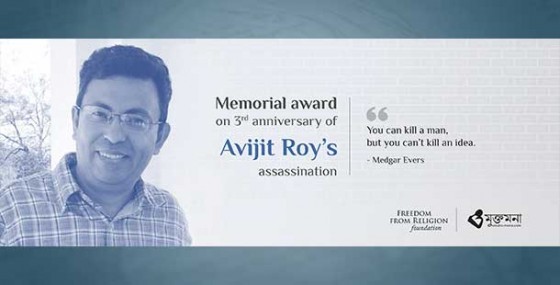
The Freedom From Religion Foundation is proud to announce, on the third anniversary of the assassination of Avijit Roy, the creation of an annual award in his name. Roy, the Bangladesh-American writer and atheist, died at the hands of militant Islamists on the streets of Dhaka.
Avijit Roy initiated a new movement in free and rational thinking in Bangladesh, South Asia and Bengali-speaking diaspora communities. He had a Ph.D in biomedical engineering, but wrote prolifically on many varied subjects that include religion, atheism, cosmology, homosexuality, and Rabindranath Tagore. Seven of his books on these subjects were published in Bangladesh.
He founded an online community called Muktomona (free-thinkers) that promoted rational discourses among mainly Bengali-speaking users across the world. As an advocate of freedom of expression, Avijit Roy took an active role in protesting the arrests of atheist bloggers in Bangladesh. His writings and activism earned the ire of fundamentalist Islamists and on February 26, 2015, he was hacked to death by militants at the Dhaka Ekushey Book Fair where his two new books were featured. His wife, Rafida Bonya Ahmed, known as Bonya, was also brutally attacked and critically wounded, but survived the assault.
FFRF will be working with Ahmed in helping to raise funds and bestow the award or scholarship, with details to be announced.
The Avijit Award will be given to a person who has been working toward the spread of rational and logical discourse, toward diminishing the influence of regressive fundamentalist religious thinking, toward building a society based on humane laws and without discrimination. The Award will recognize creative and heroic people, who — in spite of facing numerous hurdles that may include a threat to their personal lives - have persisted in their work through writing, artistic projects, activism or other means of expression to promote science, logic and humane ideas.
“We are honored to be part of this overdue memorial to Avijit Roy and to be working with his widow, Bonya, who is continuing in Avijit’s footsteps to ensure Muktomona continues, and who has personally done so much to ensure the safety of other endangered Bangladeshis,” said FFRF Co-President Annie Laurie Gaylor.
“As Medgar Evers presciently noted before his own assassination, ‘You can kill a man, but you can’t kill an idea.’ It’s vital that Avijit’s work continues so that rationalism and freedom of conscience prevail.”
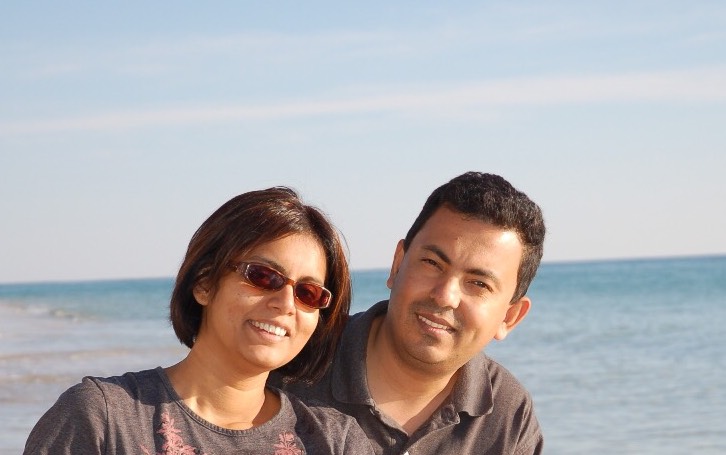
FFRF protests Billy Graham Capitol honor
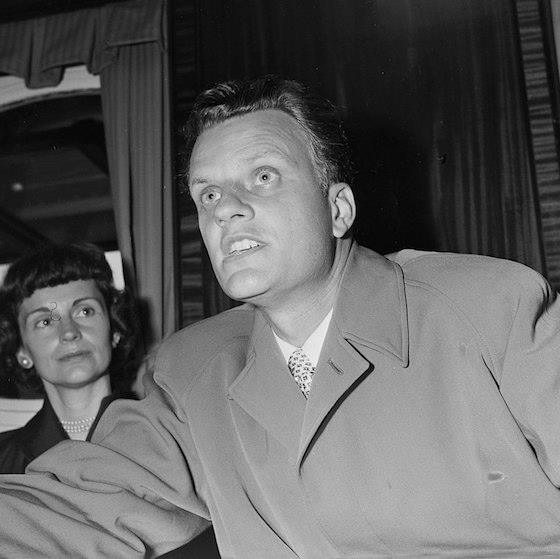
The Freedom From Religion Foundation, a state/church watchdog, is formally objecting to an extremely rare national honor being accorded to the late Billy Graham.
According to a press release from the Speaker's office, "On Wednesday, Feb. 28, the late Rev. Billy Graham will be brought to the U.S. Capitol, where he will lie in honor in the Rotunda until Thursday, March 1." Only 31 persons have lain in state in the U.S. Capitol since it was completed in 1824, 11 of them presidents and all the others known for their direct and incontrovertible service to the nation. In Rosa Parks' case, for instance, it was for her iconic role in the civil rights movement. Graham, on the other hand, worked to narrow civil rights.
"Your joint letter to Franklin Graham, dated Feb. 22, indicates this unique civic honor is being accorded to Graham for his 'long and distinguished service to the nation,'" FFRF Co-Presidents Dan Barker and Annie Laurie Gaylor write to House Speaker Paul Ryan and Senate Majority Leader Mitch McConnell. "But the fact is that Graham lived his life in service to his evangelical Christian religion, and the bible that he believed was an infallible reference manual. He placed the bible far above the Constitution."
Graham's career was devoted to revivals, Christian conversions, hellfire preaching and the insertion of his brand of religion into what is supposed to be a secular government governed by a godless Constitution barring establishment of religion or governmental preference for religion, FFRF points out. One of Graham's dubious accomplishments was to successfully lobby Congress to pass a law declaring an annual National Day of Prayer. This law enacted at Graham's behest, which FFRF has previously challenged, has entangled religion and government, spawned countless inappropriate prayer breakfasts, prayerful governmental events and prayer resolutions at all levels of government. In doing so, it has sent for generations a message that evangelical Christians are "insiders" and non-Christians and the nonreligious are "outsiders."
FFRF also highlights how irresponsible it is for the U.S. Congress to venerate and honor a noted anti-Semite. The secret taping system that recorded President Nixon's conversations and led to his Watergate downfall captured Graham's anti-Semitic musings with Nixon. "A lot of the Jews are great friends of mine, they swarm around me and are friendly to me because they know that I'm friendly with Israel," Graham told Nixon. "But they don't know how I really feel about what they are doing to this country."
Graham was on the wrong side of the leading issues of his time. The day after Martin Luther King Jr. wrote his letter from the Birmingham Jail — a letter addressed to white religious leaders like Graham who were doing little else other than "mouth pious irrelevancies and sanctimonious trivialities" — Graham mouthed a few more, arguing that King should "put the brakes on a little bit." Graham seemingly never met a U.S. war of aggression he didn't favor or encourage the occupants of the Oval Office to wage. As columnist and former priest James Carroll observes: "Billy Graham was the high priest of the American crusade, which is why U.S. presidents uniformly sought his blessing."
Graham vociferously opposed gay rights and marriage equality, saying "we traffic in homosexuality at the peril of our spiritual welfare." The Billy Graham Evangelical Association once said that Vladimir Putin was "more right" on LGBTQ rights than then-President Obama. Graham, in his 90s, wrote a full-page ad appearing in several North Carolina newspapers "to urge my fellow North Carolinians to vote FOR the marriage amendment" in May 2012, which passed, banning gay marriage until later nullified. He belonged to a denomination that refused to ordain women. The "Billy Graham" rule directing a man to not be alone with a woman other than his wife continues to influence evangelicals, including Vice President Mike Pence, isolating career women in the process.
Graham stood against much of what makes this country noble, FFRF asserts. He is not worthy of a spot in the U.S. Capitol. "The wisest path to social harmony and unity is for Congress to leave religion to adherents," FFRF notes, and to reserve the posthumous rotunda tribute for civic, secular achievers.
The Freedom From Religion Foundation is a nationwide nonprofit educational association that on behalf of its 32,000 members nationwide works to uphold the constitutional principle of separation of church and state, and to educate the public about nontheism.
Kimberly Veal, President of People of Color Beyond Faith, on 'Freethought Matters'
Kimberly Veal comes to us from Chicago and hosts the "Black Freethinkers" podcast. She is president of People of Color Beyond Faith.
The half-hour show is hosted by FFRF Co-Presidents Dan Barker and Annie Laurie Gaylor. "Freethought Matters" first airs on Madison's local WISC-TV 3, which is affiliated with CBS, on Sundays at 11 p.m.
FFRF tutors Congress: dump the Trump education budget

The Freedom From Religion Foundation is schooling Congress on why it should discard the Trump administration's proposed education budget.
The budget that President Trump announced this week would funnel $500 million to private educational institutions through school vouchers. Christian schools would be the overwhelming beneficiaries, since they make up the vast majority of private schools in the United States. The Freedom From Religion Foundation is calling on Congress to remove this voucher scheme.
"Americans support public schools," says FFRF Co-President Annie Laurie Gaylor. "We do not want to see our public money sent to unaccountable religious entities."
Trump and Education Secretary Betsy DeVos have repeatedly sought to send federal education dollars to private elementary and secondary schools. DeVos has long opposed the separation of state and church. Some years ago, she funded an unsuccessful campaign in Michigan to repeal a state constitutional protection that prevented public money from going to religious schools. As secretary of education, she is doing everything in her power to get private vouchers going full steam ahead.
By design, the budget proposal is just the first step toward funding church-operated schools. The Trump budget says, "This investment serves as a down payment toward achieving the president's goal of an annual federal investment of $20 billion — for a total of an estimated $100 billion when including matching state and local funds — in school choice funding."
A federal voucher program would create a windfall for church-run schools. In Wisconsin, 100 percent of the participating schools in the statewide voucher program are religious. In Indiana, 99 percent of voucher students attend religious schools. In North Carolina, 92 percent of students participating in the voucher program attend religious schools.
Trump's proposed budget proclaims, "So many of America's poorest children — especially African-American and Hispanic children — attend failing public schools that afford them little hope of fulfilling their great potential."
But private voucher programs by states have demonstrated that religion is the main benefactor, not students. Trump's dystopian view of public schools ignores comparative studies of voucher and public schools in Indiana, Louisiana, Ohio and the District of Columbia finding that voucher students fared worse academically than public school students.
Besides these objective measures, voucher schools often do not have to meet minimal education standards, such as school accreditation, teacher licensing and safety requirements. FFRF asserts that where public money goes, public accountability must follow. Locally elected school boards have oversight over public schools, but not religiously segregated schools.
"We ask that members of Congress listen to their constituents, a majority of whom oppose voucher schemes," says Gaylor.
Elected representatives have a lot to learn from the common folk in this country.
Ohio building mural earns FFRF’s censure

The Freedom From Religion Foundation is giving the thumbs down — because of the U.S. Constitution — to a religious mural in an Ohio building.
A concerned citizen recently contacted FFRF about a religious mural in the Findlay Municipal Building. This mural features a large eagle accompanied by a biblical verse. The verse from Psalms 91 reads: "Under His Wings Shall You Find Refuge"
The mural is unconstitutional, FFRF alerts the city of Findlay.
"The Establishment Clause in the First Amendment to the U.S. Constitution prohibits government sponsorship of religious messages," FFRF Legal Director Rebecca Markert writes to the city of Findlay. "The Supreme Court has said, time and again, that the 'First Amendment mandates government neutrality between religion and religion, and between religion and nonreligion.'"
It is inappropriate for the county to display this religious message on the wall of the Findlay Municipal Building because it conveys government support for religion, FFRF asserts. A reasonable observer would view the text as an endorsement of a specific religion by the city of Findlay, since the mural calls for viewers to seek refuge in the Christian god.
The municipal building serves all citizens regardless of belief or nonbelief, FFRF reminds the city, and with this display, Findlay appears to be preaching to the citizens required to come to the building. The message alienates the 24 percent of adult Americans who are nonreligious. It excludes non-Christian residents of Findlay and expresses a preference for the Christian faith in a government building responsible for administering and upholding our laws.
"Non-Christians shouldn't have to be subjected to a sectarian message in order to come to the building," says FFRF Co-President Annie Laurie Gaylor. "With the fast-changing demographics of our country, this number is increasing day by day."
FFRF insists that the city of Findlay remove the religious mural from the building as soon as possible.
The Freedom From Religion Foundation is a nationwide nonprofit organization that represents more than 32,000 members and has 20 chapters across the country, including more than 800 members and a chapter in Ohio. FFRF's purposes are to protect the constitutional separation between church and state, and to educate the public on matters relating to nontheism.
Freethought Radio -- February 15, 2018
FFRF urges Va. Speaker to stop promoting bible sessions
The Freedom From Religion Foundation is insisting that the speaker of the Virginia House stop utilizing state resources to recruit for bible study sessions that he's been regularly organizing.
Speaker Kirk Cox reportedly conducts a weekly bible study in the Speaker's Conference Room at the Pocahontas Building. Meetings of this bible study group are listed on the Virginia House of Delegates meeting schedule as the "Speaker's Bible Study Caucus." Cox's chief of staff, apparently at the speaker's direction, emailed every person within the General Assembly's email system to invite them to the bible study. An email from Jan. 11, 2018, reads: "All members, staff, lobbyists and friends of the General Assembly are invited to attend Speaker Cox's weekly Bible Study Wednesdays at 7AM in the 6th Floor Speaker's Conference Room beginning January 17."
Cox should not be using the office of the speaker to promote his personal faith to his colleagues, subordinates and the wider public, FFRF asserts. As speaker of the House of Delegates, Cox is uniquely positioned among Virginia's legislators, wielding significant authority over his colleagues, legislative staff — and the General Assembly as a whole. It is inappropriate for any elected official to promote a bible study to all employees of the Legislature using his or her official government email, FFRF Senior Counsel Patrick Elliott writes to Cox.
Government sponsorship of a religious message is impermissible because it sends a message to nonadherents "that they are outsiders, not full members of the political community and an accompanying message to adherents that they are insiders, favored members of the political community," to quote the U.S. Supreme Court. L
The religiously unaffiliated account for the largest single religious identity in the Commonwealth of Virginia — a full 23 percent of all Virginians, FFRF informs the speaker. When you combine this with sizable percentages of other minority religions, there is no doubt that many "members, staff, lobbyists and friends of the General Assembly" belong to a variety of faiths or no faith at all. These minority religious and nonreligious persons should not feel pressured to attend a religious event in their place of business to remain "insiders."
Of course, elected officials are free to practice their faith on their own time, in their own way. But while acting in their official capacity, elected representatives act not as individuals, but on behalf of all citizens of the commonwealth. Every member, subordinate, lobbyist, and constituent having business with the speaker of the House should be assured that the speaker will act only in the public interest — and not based on any person's religious belief, or lack thereof. Holding this bible study "caucus" and promoting it using the means of communication provided to Cox's office undermines the appearance of impartiality, FFRF contends.
Once the government enters into the religion business, conferring endorsement and preference for certain religions over others, it strikes a blow at religious liberty, forcing taxpayers of all religions and of no religion to support particular expressions of worship, FFRF maintains. Given Cox's role as an employer and a government official, it is only appropriate that he stop using legislative email and calendar systems to recruit bible study participants.
"The speaker should stop attempting to impose his religion on the entire House," says FFRF Co-President Annie Laurie Gaylor. "Cox is free to say his prayers — in his own house."
The Freedom From Religion Foundation is a nationwide nonprofit organization with more than 32,000 members, including over 700 in Virginia. FFRF's purposes are to protect the constitutional separation between state and church, and to educate the public on matters relating to nontheism.

